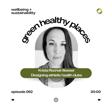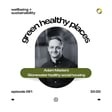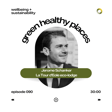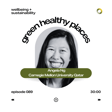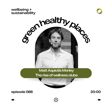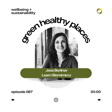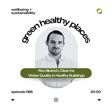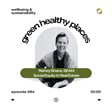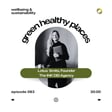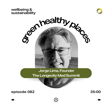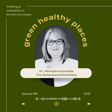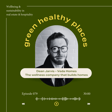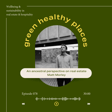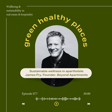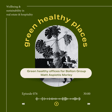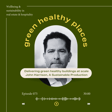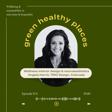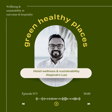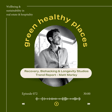Episode Introduction
00:00:10
Speaker
Welcome to episode 81 of the Green Healthy Places Podcast, in which we discuss the themes of well-being and sustainability in the built environment.
Guest Introduction: Ann Chalika
00:00:20
Speaker
I'm your host, Matt Morley, and in this episode, I'm in Bangkok, talking to Ann Chalika, Kij Kanekorn, founder and managing director of Acherine Hotel Group, a boutique hospitality business she created in 2008.
00:00:35
Speaker
built on the success of the Alinta Resort and Spa she had launched five years before that. Angelica is also founder of the Pure Blue Foundation, a nonprofit dedicated to protecting and preserving the planet's marine ecosystems and promoting environmental causes in the communities around her resort properties in Thailand.
Tourism's Impact on Environment and Society
00:00:57
Speaker
In our conversation, we cover the relationship between the tourism industry and environmental and social causes in Thailand more generally,
00:01:04
Speaker
as well as the specifics of our activities under the umbrella of the Pure Blue Foundation. Check out PureBlueFoundation.com and Alinta.com for more information on everything this powerhouse of Thai tourism is up to. Here we go.
Alinta Resort and Spa Operations
00:01:23
Speaker
Angelica, welcome to the podcast. Thank you for joining us today. Could you start with a quick overview of the hospitality operation that you're running today with these three distinct but connected brands of Acherine, Alinta and Ayurah? So um my name is Angelica and I'm the founder and managing director of Acherine Hotel Group. um And within the group we have the Alinta Resort and Spa and um We have the Ayouro Wellness um as a two different um offerings. So the Alinta Resort and Spa, it's a um luxury boutique hotel. um We have three properties now in Thailand, one in Chiang Mai, one in Phuket Pangga, and one in Hua Hin Primary area. And um Alinta is ah is a bit of a, ah ah
00:02:22
Speaker
almost like a little and hidden piece of paradise. um Usually where I put them is a little bit out of the way because personally, I don't like to be in the midst of, I don't like to be with a lot of people when I'm on vacation. So all of my hotels are a little bit outside, but easy enough to get to.
Unique Hotel Locations
00:02:43
Speaker
um So that people who are a little who are busy can just get in and out very quickly, for example,
00:02:50
Speaker
um The one in Phuket, Pangga is within 25 minutes from Phuket International Airport, which is really, really well connected all over the world. But you know once you get to the airport, you're there within 25 minutes. But you feel like you're a world away because you're not exactly in Phuket Island. You're further out and toward Pangga Province in the mainland. And the beach is miles and miles long, beautiful, sandy. And the best part is there's never anybody on it.
00:03:20
Speaker
um which is my kind of beach. um And um the Acurino Hotel Group is the overall operating managing management company of all of the hotels within the
Akira Brand and Ayurah Wellness
00:03:35
Speaker
group. We have another brand, which is called the Akira. The Akira is a little bit more of a quirky um ah city center kind of hotel. We currently have one in Chiang Mai in the city center with a rooftop.
00:03:50
Speaker
bar and a very busy restaurant on the ground floor. It's in the middle of everything. um The ah Euro Wellness is a wellness brand that we've created um as a um almost like ah and as an extension um of our spa.
00:04:11
Speaker
ah The reason why I wanted to kind of carve it out um to be it's on its own is because there's a lot of work going into it, and it's not just is not just a spy in a hotel.
Wellness Retreats Overview
00:04:23
Speaker
um The aura wellness provide lots and lots of different retreats, whether it be ah for your mind, for your body. um For example, in Alinta, and and so all of our hotels has aura wellness inside.
00:04:41
Speaker
um Yeah, so for example in Elinta retreat Chiang Mai um because of where it is, it's next to one of the most famous um temple temples in Thailand and it's very famous for ah meditation and vipassana. So we do um different levels of vipassana and meditation retreat there. It's really immersive and um very, very ah um authentic and different. So that's if I could say that myself, um we've got a lot of a lot of people coming from all over the world wanting to try um to do the meditation the way it was originally found.
Pure Blue Foundation's Marine Conservation Efforts
00:05:26
Speaker
So it was really, really interesting. Yeah.
00:05:29
Speaker
And so there is a mix then of city, urban locations and coastal locations. And then you have the Pure Blue Foundation, which is specifically focused on submarine conservation. So at what point did that enter the scene? ah When did you introduce that and what was the birth of it and what are its objectives?
00:05:49
Speaker
It was from the beginning, actually. um As soon as I found the hotel, um I also found a pure blue foundation. So it's as old as my hotel. And the reason why I did that is because I wanted to make sure that wherever I go to make a living, create a business, I am part of the solution and not the one that come and destroy the beautiful places that I've discovered. So.
00:06:14
Speaker
you know, but we launch a hotel on the beach in this beautiful place. I want to preserve it. I wanted to keep it that way. And so we launched a pure blue foundation. And it was launched with my beach resort. And that's why I called it pure blue. But now we're, you know, we we we we do more than just the the marine conservation. Now, in the beginning, it was really the marine conservation. we have had um ah coral reef restoration project. ah We've had, ah we we continue and we still have the, ah on the beach where we are, we still have turtles coming to lay eggs. So we um we we we work with the local fishery departments to
00:07:02
Speaker
support them in terms of their study, their ah their program to protect the nests. And we also have a lot of turtles that for some reason, when they get ah when they get injured in the ocean, they would walk up to front of our beach, I have photographs, many, many photographs of of turtles with like nets all over them. And somehow they found their way to my hotel and we would take all these things that they got caught in out and then we would take them to to to be cared for at the at the Fishery Department. But it was really funny because we've been doing this for such a long time. So I don't know, maybe the turtles know, but definitely the the people from around there, whenever they find a turtles, they'll bring it to us rather than to the
Sustainable Practices in Hotels
00:07:55
Speaker
Fishery Department. So we'll just get them and then bring it over to the, so it's, it's
00:08:00
Speaker
It's nice, it's ah it's ah we've become part of the part of the community. But because we've um branched out to have hotels outside of the, and in in in in in the Hills area now and in the Chiang Mai up north now, we also do other things together with the Piavolo Foundation, including working with the community to and local schools to talk to them about environments basically because I think it's easier to start with the children because it's easy's a lot more difficult to change the minds and hearts of the older people like us. So um we work with the with the kids.
00:08:47
Speaker
Personally i I don't like single-use plastic and so all of our hotels have become single-use plastic free since 2018. So we work with the local school to to to talk to them about single-use plastic. I mean, I don't want to demonize all of the plastic. I mean, I still use plastic. I mean, my phone is plastic. I think my phone is plastic. I don't know what it is. My pen is plastic. So plastic still is still good. It's not that you can't use everything, but it's just that you can't you shouldn't just use it once and throw it away. um And this has been something that from when I was very young, I hate throwing away things. so
00:09:28
Speaker
from when we started the hotel, i never I never had these little bottles of shampoos and in our hotels because I used to travel to Europe and America and all these places with these little plastic bottles. And whenever I go, I would always come home with these little plastic bottles, not because I really like them, but it's just that I couldn't bring myself to throw them away because it's such a waste. And so I had to, I find myself with like all these plastic bottles at home.
00:09:55
Speaker
And I don't know what to do with them. um So when I first started at my hotel, ah I just from, and this is from 2003 when I started my first hotel and we never had these plastic bottles. We just have always used ceramic, beautiful ceramic handmade bottles and we just refill them. um but So to change from from all of that to non single use, to become a single use plastic free hotel is not The first 80% is not that difficult. It's really low hanging fruit. It's the last 10, 20% that you have to, that is really, really difficult, which includes, you know, getting rid of the plastic water bottles is easy. You just don't order them and then you're there. But um when you when you when you buy things from your suppliers and then it comes in these it three times wrapped in plastic, you have to actually
00:10:53
Speaker
have to work with your suppliers to find a different way to to to get around that. so So I wanted to say that you know we're probably 90% there, but it's still another 10% that we couldn't get around. um But I digress. The that pure blue is is not just for marine, because we're also now, we're working with the with the, not only with this local school, but the the most exciting project that I'm working on right now, um we're working on it right now as we speak, still raising money, but probably gonna find it, um is that we're doing an endangered animal, a rescued animal protection area in the north. So in the north of Thailand, we're close to jungles,
00:11:46
Speaker
And there's a lot of poachers. And then they they go into the jungle and they find all these animals that I didn't have never seen, that they existed. And and then they set and then they they try to
Sustainability Certifications in Hospitality
00:12:00
Speaker
sell them. And from time to time, the Thai police will find them and then rescue them. And then we all have to be to rehabilitate them before we send them back into the jungle.
00:12:13
Speaker
So we're working with the the forestry department to ah support them in their work. But at the same time, the the the forest that is near the forest that they're rehabilitating these animals are not far from where we are in Chiang Mai. So we're we we're creating a lookout. I don't know what exactly you call it, but it's probably a spotting platform.
00:12:40
Speaker
So we can see all these animals coming out at night ah in this area so that my guests can go and see them. Because these are wild animals and you don't i don't you know you don't want to put them in the cage, but you can't put them back in the in this in the in the forest yet. So this is something that we're working on. We've got some deers, some monkeys that with no ears. I've never seen these monkeys before, but there's some monkeys without ears. I don't even know what they're called and and some other animals. This is really fun. Yeah.
00:13:13
Speaker
And has the the evolution of that policy around sustainability and working, you know, implementing the foundation, has that been quite sort of natural and organic or was there, have you had consultants come in to help? Have you followed any specific guidelines or has it been more just your own value system that has led you to certain solutions?
00:13:34
Speaker
you know some hotels were just say okay we're going for a green hotel certification system and then up up up book there's a hundred points that we need to follow and it's almost like a checklist right it sounds like you've kind of gone from a very different approach starting 20 years earlier so you've been at it for a long time and how has it evolved has it been the same sort of a natural approach or have you had to put some structure in over the years?
00:14:00
Speaker
We've been doing it out of ah organically. So it's all the things that that we should, that that yeah. um We were doing it before it was fashionable. So there was no guideline to follow. um We actually have to, exactly what you were saying, we had to actually doing do it backward um to try to find, to get certified.
00:14:25
Speaker
um And right now we're, you know, and and then all this certification, it changes. um So it's a little bit in Thailand, you have something called green leaf, and we did that. And then in hi Thailand, Thai government, it's, we've got some other things like that. And then within small luxury hotels, we're part of the considerate collection. So we pretty much have everything that they need. We just need to kind of go in and fill in the, tick the boxes that they provide.
00:14:54
Speaker
We're working on travel line certification now because but I just found out. We just found out this year that a lot of the certification that we have ah no are no longer in
Solar Energy and Sustainability Goals
00:15:04
Speaker
fashion. So we got a new one. So it's like it just kind of keep going like that. But um um yeah.
00:15:13
Speaker
and And you know, a lot of times you you are asked to measure things that people, you know, a lot of time these people are coming up with things that are because they need to measure something, right? And everything is to be done in numbers. So a lot of times you kind of like, I don't know how these people fill out the numbers. um A lot of the numbers are probably made up, but you know, you just need to fill it in. It's almost like you're trying to fit it in. um So I don't want to say anything bad, but it's just sometimes it's very difficult to measure these things. For example, you are asked how many
00:15:52
Speaker
plastic have you saved this year? How am I supposed to? You know, I think probably, you know, by if I really, really count it, we haven't used plastic straws in forever. So we probably have it have a couple of tons. You know, how do you know all of that unless you hire somebody to start weighing your? No, you can't because you don't have plastic. So how are you going to weigh it? So yeah, but some of the things are easier to to to measure. For example, um during the last five no yeah five years, we've been turning more and more toward ah renewable energy. So ah more than 25% of our ah energy at the resort comes from our renewable. And we did that because
00:16:45
Speaker
for economic reasons, you know, we're in Thailand, we're full, it's full of sunshine. So the electricity is very expensive, but I'm very happy to know to know that, you know, 25% of our energy is renewable, it's come from solar and we're putting in more and more um because solar panels is becoming more and more efficient.
Guest Engagement with Sustainability
00:17:07
Speaker
You're implementing your own solar panels or you're buying solar energy from the Thai national grid. I'm selling mine.
00:17:14
Speaker
tight great yeah But in my house, I'm selling it. But in the hotel, we used everything and more. So so we actually have our own solar.
00:17:29
Speaker
ah Pretty much every single roof I have, it's got solar on top. yeah Great. And what's the relationship then between these various sustainability and social initiatives and the guests?
00:17:43
Speaker
in your resorts. Is there a direct relationship? Do they experience any of this? Is it something that they contribute to with their with with some kind of a financial contribution or with their time? Or is it something that is more present at the brand level that they buy into? Do you think there's a general awareness amongst the guests of what you do? Or is it more led from your side that you just think is the right way to to do business? I personally At the end of the day, I don't think that anybody make a decision to stay in a hotel, whether or not this particular hotel is certified or not. I mean, I don't think i don't think people do that. um I'm just going to be, sorry, what's the word? but and But I think that nowadays everybody at a certain level of of of luxury assume that
00:18:42
Speaker
you're doing it. So it's almost like an under and and and and understanding a basic requirement that you're doing some something.
00:18:54
Speaker
um Yeah, so we're doing it because it makes sense economically. We're doing it because if I don't preserve and protect where I'm where I make a living,
00:19:10
Speaker
I will not be able to make a living there for a long time. So this is why I'm doing it. and And this is what I'm telling the community around me. If you don't look after the beach, if you don't clean it, if you continue to throw things into the sea, how long do you think people are gonna come and and and and and spend their holidays here? So we're gonna keep it nice. And that's just the basic level. And I think that kind of that kind of communication, I think, hits home more than you need to not throw things in the sea because it's going to kill a whale. Nobody in Thailand will think twice about, you know what I mean? It's not, okay, you see the whale getting caught in nets on TV. It's not,
00:19:57
Speaker
it's not it has nothing to do with you when you're living here. You know what I mean? But if you say, if you don't look after it, you don't clean it, nobody's gonna come. And if you nobody comes,
00:20:09
Speaker
you can't make a living.
Government Actions Against Overtourism
00:20:10
Speaker
That's that's more of a practical way. The industry itself then, I mean Thai hospitality, hotels, resorts, as a sector How do you see its relationship with with that topic of sustainability and a sort of yeah a longer-term view to protect its own environment? Is it a problematic relationship? Are you seeing that the let's perhaps that the luxury end of the market? There's wider adoption. How bad does it get at the lower end of the market? Is it is there improvement happening? Do you see it from your perspective?
00:20:45
Speaker
You know, um two things about that. I actually am really happy to see that there's some movement from the government level to actually close down some of the beaches because of the overtourism. For example, Pee Pee Island was closed for a while. um Some of the national park that um that is really, really amazing. It's got amazing dive sites are closed for a couple of years to let it three
00:21:17
Speaker
regenerate um is never enough. but you know and ah and and And that has to do with um too many people going there. people who People who run the dive schools are not really ah are not really fit to run the dive school. um you know how i don't when i When I was learning how to dive at the time I was working in Singapore, it took me three, four months to get certified, the first one. I don't know how people go to Kotau and get licensed to open water in a day. it I don't know how that happens, but for sure, those people don't know how to how to dive in such a way that they can control their own buoyancy, so they don't touch the reefs to use it as a way to stabilize. They don't know
00:22:13
Speaker
ah how to control it so that they hits everything along the way and then breaks everything. um And it's not it's probably not very safe. But um that's that's that's some that's the the man the the mismanagement from from the from the from the from the government up. But know saying seeing all of these, I have seen that their work that they are that they're starting to close down sites that needs to to to to take a break.
Food Waste Management and Green Practices
00:22:44
Speaker
um So that's a good news. that's That's good move to the right direction. um And you know I think that that I've seen areas of of our of Thailand that are cleaning up and trying to move toward better, um less, ah yeah.
00:23:09
Speaker
less less of a quality quantity, more of a quality type of experiences. yeah And I know a lot of resorts are obviously dealing with a recycling and waste issue to do with the kitchen, Thai cuisine, one of the biggest selling points for the for the hospitality industry. I noticed that you've done some work around creating a sort of green kitchen concept that some of your resorts where you've obviously perhaps received the reward for it. Can you tell us a bit about that process? Because it's perhaps not immediately obvious to most guests
00:23:42
Speaker
the impact of waste and kitchen oil, et cetera, from a commercial kitchen and where yeah the issues that you face as a hotel management company dealing with that. But you've obviously found a solution. Yeah. um You know, the kitchen, the thing is, we're we're but such a small, that my hotel is by nature, we're small hotels. So my my smallest hotel is 20 rooms and the biggest one is 66 rooms. So we're not exactly you know, 300 rooms hotel. um Those are the kind of hotels that you will get a lot of waste because they do big buffets. And when the buffet doesn't get eaten, those are the things that you have to throw away. ah Fortunately, we don't do buffet. um Everything is a la carte, cook to order. So that's the first thing about not having a lot of waste because we're don't we're not dealing with
00:24:39
Speaker
600 people going to the breakfast at 8 o'clock in the morning. you know So um it's a lot smaller than that. Everything is a little bit more tailor-made. Everything is a little bit more um personable. So it's not a lot of waste in that scale. So we're not industrial size hotel. um That's one thing. The second thing is with the cooking oil you were talking about, um we're actually signed a MOU with a startup in Thailand to collect all of our cooking oil.
00:25:10
Speaker
um They're turning it into a jet fuel. i I didn't even know that you could do that, but ah bless them if they can. So we're we're we're doing that for them. um Let's see what else. ah We actually have farms, an organic farm, and chicken coops in one of our hotels. Actually, the the the organic farms um and the herbs farms we have in all of our hotels. But one hotel in particular,
00:25:39
Speaker
even have a chicken coop because it's fun to have and we have the space. And my guest loves riding the bicycle to the chicken coop and pick their get their own eggs in the morning, come back and give it to the chef to to to to order their eggs.
Future Projects in Bali, Chiang Mai, and Pattaya
00:25:55
Speaker
So definitely no waste there.
00:25:59
Speaker
yeah but that's That's kilometre zero where you're able to have some production on site. right I know you're also working on a ah future resort project that's sort of maybe a few years down the line. like Where does the business go from here? what' What's next for your um for the business? um i am i am the I am blessed in in a way that when um when ah have you know people come to me and say, hey, I want to open a hotel here and there, we should be able to help. and I have been looking at ah some projects that is of interest. So there's one in Bali. We've been working on it since before COVID and it has stopped during COVID. So it's coming back. We're looking at the design right now. We're looking at something in Chiang Mai and something in Pattaya.
00:26:49
Speaker
So there are projects comes and to us and, but, you know, these developments takes time and some of them will come into fruition and some will not. So we'll just, we'll see. Yeah. Very cool. Great. So for people to learn more, we have purebluefoundation dot
Conclusion and Further Information
00:27:08
Speaker
.com. And then if you go to akarin.com, does that then that can lead you to all the other sub brands? Yeah, it can. Yeah. You can just go to akarin.com and then you'll I could not calm itself, as just it's just a my office. So the more fun and interesting thing to look at are are the hotel's website, but you can go to Akron and then you should normally get there. Cool. I'll add the links at the end of the the show notes. Thank you so much for your time. That was really cool. Thank you, Matt.

